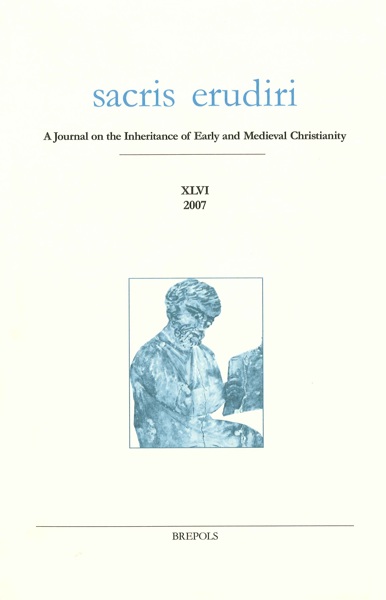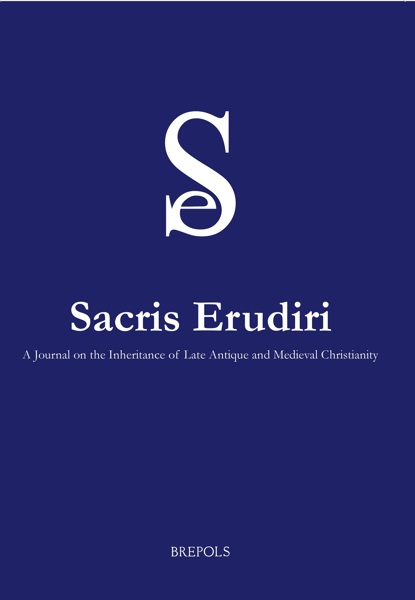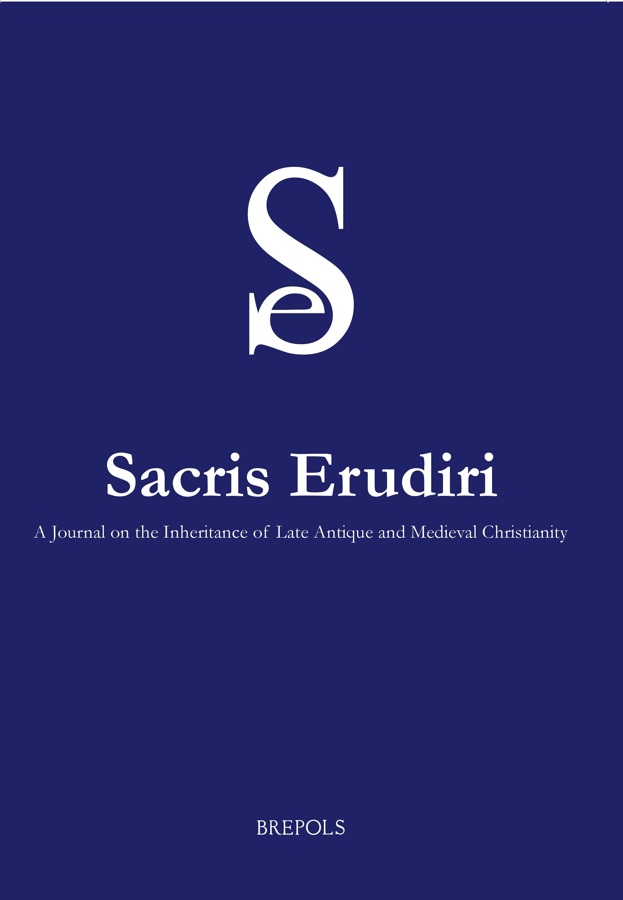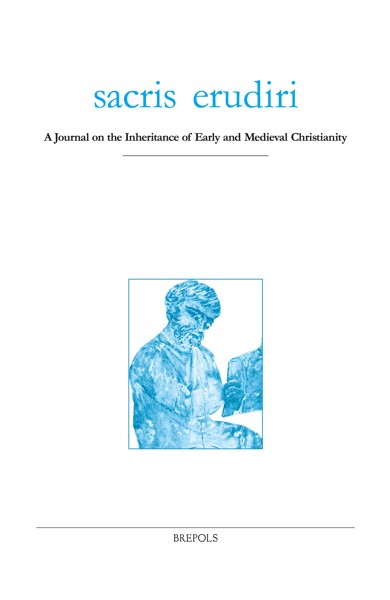
Sacris Erudiri 51 (2012)
- Pages: 411 p.
- Size:178 x 254 mm
- Language(s):English, French, German
- Publication Year:2013
- € 91,00 EXCL. VAT RETAIL PRICE
- ISBN: 978-2-503-54386-4
- Paperback
- Out of Print
- E-journal
- Available
Sacris Erudiri. Journal of Late Antique and Medieval Christianity.
Sacris Erudiri was founded in 1948 by Dom Eligius Dekkers as a Jaarboek voor Godsdienstwetenschappen, an annual journal for the study of religion. The founder's aim was to bring to public attention specialist studies and research on very diverse aspects of the study of religion and in this way to promote interdisciplinary dialogue. Since then, Sacris Erudiri has developed within Corpus Chistianorum into a leading, peer-reviewed, international scholarly journal with a focus on the Christian past before 1500 AD.
The journal’s mission is to be, in the broadest sense possible, a Journal on the Inheritance of Late Antique and Medieval Christianity. Thematically, it covers the history of Christianity in all its aspects: institutional, doctrinal, liturgical, spiritual, cultural. Christianity is not studied as an isolated phenomenon but its integration within the wider social fabric, consisting of political, social, economic and cultural elements should, where applicable, also be taken into account. Contributions may cover all scholarly genres: incisive short note or extensive Forschungsbericht, exhaustive catalogue or paradigm-shifting synthetic study, new interpretation of a well-known text or first analysis of a virtually unknown text. Editions and studies of texts in Latin and Greek as well as in Oriental versions are especially welcome.
Sacris Erudiri is a Brepols journal, published in cooperation with Corpus Christianorum.
Johan Leemans – Bart Janssens, Editor’s Preface
Hajnalka Tamas, Passio Pollionis (BHL 6869). Introduction, Critical Text and Notes
Brian Matz, Baptism as Theological Intersection in Gregory Nazianzen’s Oration
Anselm Blumberg, Ambrosius von Mailand und die Metapher von der Besiegelung mit dem Heiligen Geist in seinen Taufkatechesen „De sacramentis“ (sacr. 6,2,6-9) und seiner systematischen Schrift „De spiritu sancto“ (spir. 1,6,78-80). Zwei unterschiedliche Textgattungen im Vergleich
Thomas R. Karmann, Johannes Chrysostomus und der Neunizänismus: Eine Spurensuche in ausgewählten Predigten des antiochenischen Presbyters
Susanne Müller-Abels, Christliche Gemeinde in einer spätantiken Großstadt: Die Apostelgeschichtshomilien des Johannes Chrysostomus
Geoffrey D. Dunn, Innocent I’s Appointment of Boniface as Papal Legate to Constantinople?
Gert Partoens, An Anti-Donatist Sermon on Fasting: Augustine’s De utilitate ieiunii: A New Critical Edition with Philological Introduction
Bart van Egmond – Anthony Dupont, Augustine’s Use of the Concept of Praeuaricatio. A Case Study in the Recent Debate on Continuity in Augustine’s Doctrine of Grace
Nestor Kavvadas, Narsais Homilie „Über die Väter, die Lehrer Diodor von Tarsos, Theodor von Mopsuestia und Nestorios“
Brandon W. Hawk, A Fragment of Colossians with Hiberno-Latin Glosses in St. Gall, Stiftsbibliothek, Cod. Sang. 1395
Lukas J. Dorfbauer, Zwei Florilegien von theologischen interrogationes und responsiones in Monte Cassino: Item alie questiones in quibus sunt nonnulle de Genesi (Bibl. Abb. 29) und Item questionem veteris testamenti (Bibl. Abb. 187)
Samu Niskanen, The Origins of the Gesta Francorum and Two Related Texts: their Textual and Literary Character
Lenka Karfíková, Filius tetragonus primus. La philosophie trinitaire d’après le commentaire chartrain Librum hunc
Carsten Wollin, Vera loqui liceat. Eine ungedruckte Satire gegen die ungastlichen Zisterzienser von Pipewell
Elisa Brilli, L’entente entre Orose et saint Augustin. Contribution à l’étude de la réception médiévale des Historiae
Katrien Levrie, Pour une histoire de la tradition imprimée du De duabus Christi naturis de Maxime le Confesseur




